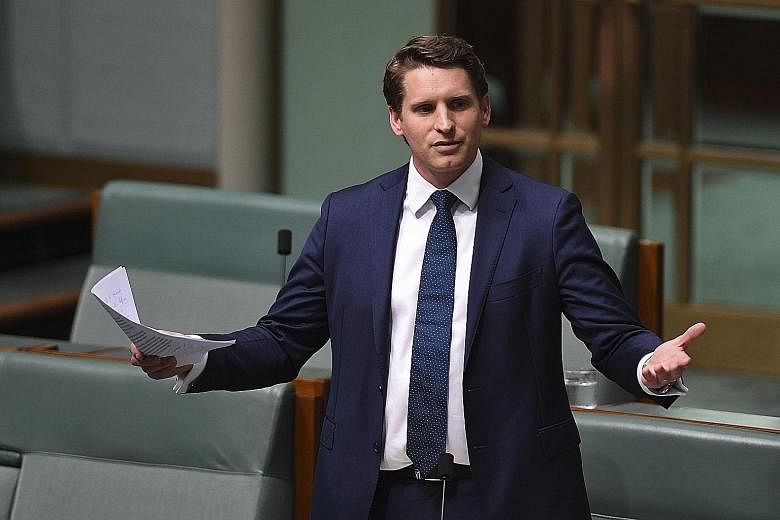Before entering Parliament at the age of 32, Mr Andrew Hastie served with Australia's elite special forces and went on several tours of Afghanistan. Now 36, he has yet to shy away from combat.
Last week, Mr Hastie, who chairs Parliament's powerful Security and Intelligence Committee, caused a rift among his colleagues in the ruling Liberal-National coalition by penning a provocative newspaper column that likened Australia's approach to China to France's failure to respond to the rise of the Nazis.
He said Chinese President Xi Jinping was set on replacing capitalism with socialism but that Canberra was ignoring Beijing's ideological motivations. "Like the French, Australia has failed to see how mobile our authoritarian neighbour has become," he wrote in The Sydney Morning Herald.
"Xi Jinping has made his vision of the future abundantly clear... Our next step in safeguarding Australia's future is accepting and adapting to the reality of the geopolitical struggle before us."
Mr Hastie's claims, as he admitted, present Australia with an agonisingly difficult predicament, in which it must choose between the US, its closest security ally, and China, its largest trading partner.
Any moves to resist or contain China could affect Australia, which has enjoyed a world-beating 27 years of consecutive growth, fuelled by Chinese demand for Australian resources and an influx of Chinese students and tourists.
The comments led to support as well as condemnation from Mr Hastie's fellow MPs. Some in the business community also warned that his claims could threaten Australia's lucrative exports to China.
Trade Minister Simon Birmingham said the Nazi analogy did not appear to be "helpful to Australia's national interests".
But Home Affairs Minister Peter Dutton, a staunch conservative, was supportive and said Mr Hastie was privy to intelligence that other MPs were not.
Mr Hastie's comments earned a rebuke from the Chinese Embassy in Australia, which accused him of a "Cold War mentality and ideological bias". A spokesman said: "We urge certain Australian politicians to take off their 'coloured lens' and view China's development path in an objective and rational way."
The frenzied responses appeared to reflect Australia's anxieties about its future in Asia and its lack of a plan for dealing with the rise of China and the relative decline in power of the United States.
Former Australian prime minister John Howard said that handling relations with China was increasingly difficult because the country had become more authoritarian under Mr Xi. He said the ongoing tensions in Hong Kong were a reminder that China's mix of economic liberty and political authoritarianism is "maybe... not going to be very successful after all".
"The economic importance of China to Australia is overwhelming, and we should never lose sight of that," he told a mining conference. "But (the relationship) is getting harder, because the regime in China now is a lot more authoritarian than the one that was in power 10 years ago."
This debate about Australia's approach to China came after a recent meeting in Sydney between Australia's foreign and defence ministers and their US counterparts.
The meeting involved declarations of support for the alliance from both sides but included some notable differences in outlook.
Prime Minister Scott Morrison was quick to rule out the prospect of the US building intermediate-range missile bases in Australia after US Defence Secretary Mark Esper appeared open to the possibility.
In addition, the rhetoric from Canberra was far less hostile towards Beijing than that from Washington. While the US has increasingly depicted China as a strategic rival, Australia continues to describe both the US and China as "key partners".
But there are growing concerns that the US-China rivalry will make it harder for Australia to continue with this delicate dance.
Notably, Mr Morrison did not take a stance on Mr Hastie's comments, simply saying the MP was "entirely entitled" to his views.
Political commentator Laura Tingle said this showed the Prime Minister's failure to articulate a plan for dealing with Australia's serious strategic and economic challenges.
"The bitter reality is that the government doesn't actually have any idea what to do about either the growing US-China tensions, or the growing Chinese belligerence," she wrote on the ABC News website.
"Australia's foreign policy discussion - such as it is - often seems to roll along in a torpor that is out of sync with what is actually happening in the world."

